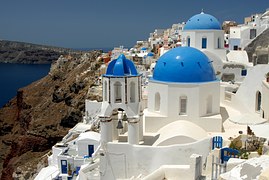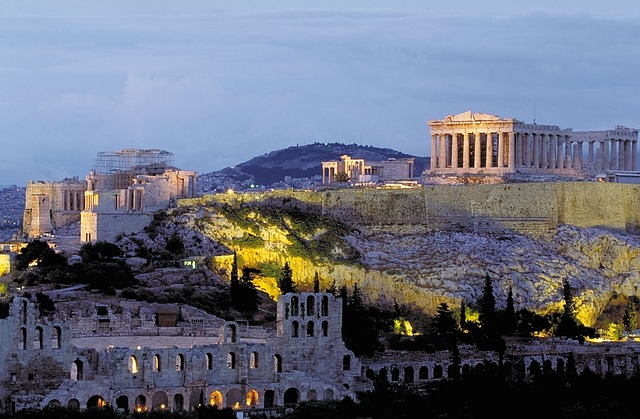GREECE
It could be another destination for your travels in Europe, especially in the summer months when many curious tourists and travellers visit this country located in southeastern Europe. It is located next to three seas, the Aegean, Ionian and Mediterranean, which refresh its coastlines bringing a special atmosphere. Greece is not only Athens, Mount Olympus or gods, it also has more than 1,000 islands and 7 archipelagos and all these offer a spectacular setting in which to relax and pass some time in the history of this magical country. 
Almost 11 million people fight for space in Greece, some live in the capital and others are spread around the country. Speaking their language, Greek, maybe you will not understand them, but through their kindness and patience you will have no problem with communication.
The capital of Greece − Athens, is the most popular and largest city in the country with a profound history. By viewing and admiring the monuments and points of interest − the Acropolis, the Parthenon, the Ancient Agora and Theatre of Dionysus − you will better understand the background story that makes Greece so famous and popular.
Visiting the country would be very interesting and it is recommended to discover other big cities of Greece like Thessaloniki, Alexandroupolis, Heraklion and Mykonos.
EU Member
Greece joined the European Union on 1 January 1981. Ten years later it joined, among others, the euro zone which means that the currency of Greece is now the euro.
Greek Weather
If you have already decided to travel, you probably want to know about the Greek climate. It is important to know that the climate is typically Mediterranean, with mild winters and humid summers. The western part of Greece is characterised by having more rainfall; in fact you can see snow in the highest peaks of the mountains. The hottest months of the capital are July and August with temperatures between 30° and 35°C and winters are usually quite pleasant with temperatures around 6°C and 8°C. 
Crete and other Islands ...
Crete is the biggest island in Greece and one of the most favourite places in the country for all seeking relaxation on islands and beaches. You can find many sites dedicated to Greek gods, and monasteries, caves and other places that await you if you decide to go and meet Greek history.
Apart from Crete you can choose from other islands in Greece − Zakynthos, Santorini, Rhodes, Kos and Thasos are among the favourites.
Greek Culture and Architecture
The culture of Greece is the most interesting thing that the country can offer you. By this we mean the Greek philosophy, religion and science. Who does not know Aristotle, Pythagoras and Socrates? They and others have given the country a great history which still today is proudly presented and studied in many universities with great interest.
The architecture is famous for its open-air theatres, temples and columns.
All this and more can be discovered but only when you decide to visit Greece.
Religion in Greece
Greece is one of the European countries where people practise the Orthodox religion. Compared with other countries in Europe, in Greece there are not many Catholics. There are minority numbers of Protestants and Jehovah's Witnesses. 
At the end of our tour of this country full of history, we will discover a little Greek cuisine. This is based on Mediterranean cuisine. Among several dishes, we can highlight a typical Greek food: this is Gyros, famous throughout Europe as well, which is simply roasted meat served in pitta bread with vegetables such as onions and tomatoes.
However, there are many other rich dishes worth trying if you decide to visit Greece.
Useful Tips
-
The best time to visit Greece is spring and autumn. While most tourists travel to Greece during the summer if you choose dates outside this period you will not have problems with overcrowding and the exhausting heat.
-
In case of any emergency call 112
-
Banks are open from 8:00 to 14:30 from Monday to Friday. If you need to change currency, please note these opening hours.
-
The tap water is drinkable and you should drink sufficient because the heat and temperatures, which are high, especially in summer, can cause dehydration.
Editing by: Catherine Parker

